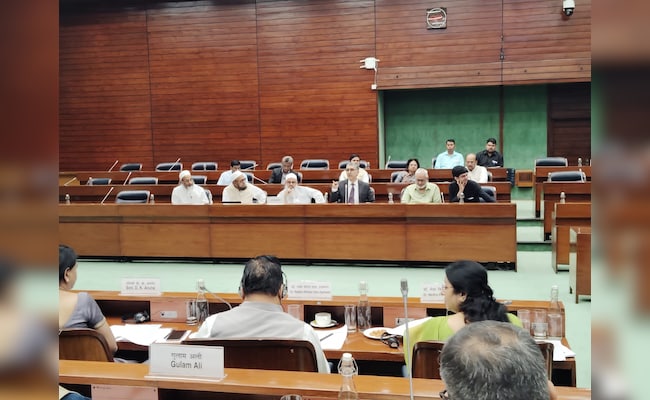[ad_1]

New Delhi:
The Opposition lawmakers have abstained from the Joint Parliamentary assembly intended to deliberate on the Waqf amendment bill and communicated with the Speaker requesting the removal of Committee chairman Jagdambika Pal. Accusing the Committee of partiality, they have requested an audience with the Speaker to address the matter.
The Opposition representatives claimed that a presentation regarding the bill by Anwar Manippadi, the former Chairman of the Karnataka State Minorities Commission and the Karnataka Minorities Development Corporation, was off-topic. They asserted that Mr. Anwar was merely utilizing the platform to disparage the Karnataka administration and Congress leader Mallikarjun Kharge.
“We chose to abstain because the committee is not operating in accordance with the principles and standards of the committee. They are ethically and fundamentally wrong,” expressed Shiv Sena (UBT) MP Arvind Sawant.
Alongside Mr. Sawant, Congress’s Gaurav Gogoi and Imran Masood, AIMIM’s Asaduddin Owaisi, Samajwadi Party’s Mohibbullah, DMK’s A Raja, and Aam Aadmi Party’s Sanjay Singh were observed exiting the meeting in a huff. The gathering led by Mr. Pal proceeded as the Opposition lawmakers congregated to consider their next strategy.
The Waqf (Amendment) Bill was presented in the Lok Sabha on August 8 and, despite considerable resistance from the Opposition, was assigned to a Joint Parliamentary Committee. The committee — which is required to deliver its findings to the Lok Sabha by the conclusion of the first week of the forthcoming parliamentary session — is currently engaging in a series of informal dialogues with various parties involved.
The Waqf (Amendment) Bill, 2024, aims to implement extensive reforms, incorporating digitization, more stringent audits, enhanced transparency, and legal frameworks to recover unlawfully seized Waqf properties. The existing legislation, originating from 1995, is recognized to possess numerous gaps that facilitate corruption and mismanagement of Waqf assets.
The suggested amendment consists of two principal components — marking the first instance of women’s inclusion in Waqf boards; and confirming that land is authenticated before being designated as Waqf property.
[ad_2]
Source link








Leave feedback about this